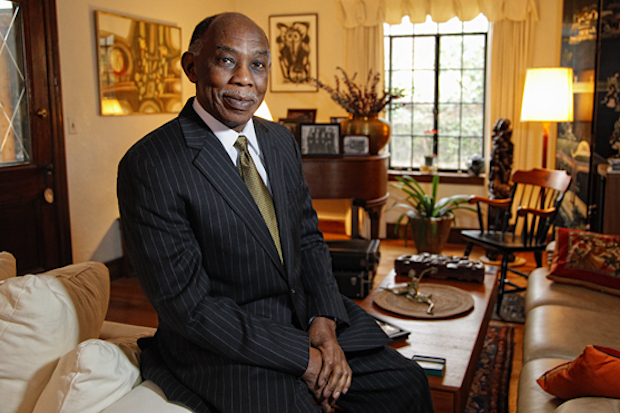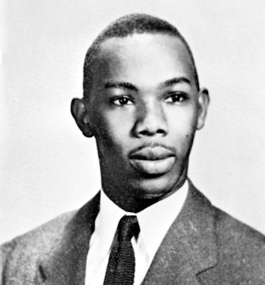Herman Hemingway ’53, first Black man to graduate from Brandeis, passes away at 88
 Photo/Mike Lovett
Photo/Mike LovettHerman Hemingway in his home in 2013.
Herman Hemingway ’53, who passed away in Boston on Dec. 14 at 88, was the first Black man to graduate from Brandeis. He had a dream to further the cause of social justice, to fight racial prejudice and to advocate for the poor, and he did so as a public defender, an administrator of public housing programs, an architect of the Boston Human Rights Commission, and chair of the criminal-justice department at UMass-Boston.
“Throughout my life, I have believed that everyone has a sense of fairness and justice, and that the first step was to acknowledge one’s own belief in self and in the strength of one’s own truths,” Hemingway told the Brandeis Alumni Association in February 2020. “I have learned to fight for (those truths) regardless of the known or unknown consequences,” he said.
“He paved the way for many African-Americans, like myself, who are current or future Brandeis alumni,” said Curtis Tearte ’73, vice-chair of the Brandeis Board of Trustees. “I would say we stand on the shoulders of Herman Hemingway.”
Hemingway grew up in Roxbury when the neighborhood was heavily Jewish, and while Harvard, Boston College and one-year-old Brandeis all offered him scholarships, he chose Brandeis because he thought it was “innovative and exciting.” He majored in Near Eastern and Judaic studies at Brandeis, and earned a law degree from Suffolk University.
The fraternity brother of Martin Luther King Jr. said his lifelong efforts to fight discrimination and bring about positive social change began young. “Even as a child I was faced with having to survive in a society that considered me flawed,” he recalled. “At the age of 12, I marched in demonstrations against the racism that restricted folks that looked like me from fair housing, fair education, fair employment and competent health care. I was taught by the social institutions to believe that this was the way the world was, and to survive, one had to accept and adapt.
“It was at Brandeis that I learned that the tools of change were within my grasp,” Hemingway said. “Later in life I would use those tools to address racism in the military, in law school and finally in the criminal justice system. I have used the study of law as my most valuable tool. And sometimes I have succeeded and sometimes failed.”

Herman Hemingway's 1953 yearbook photo.
Hemingway began his career as a public defender for the Roxbury and Chelsea District Courts and built a reputation as a strong advocate which allowed him to ignite systemic change by serving as a liaison between the people and the city government. He went on to open his own law practice, focusing on civil rights, and served under Boston Mayor Kevin White in the 1960s as an acting administrator of the Boston Housing Authority and as an assistant commissioner of housing inspection.
He served on the boards of the Roxbury Boys and Girls Club and the Roxbury YMCA, founded the Street Lawyers Program, a program that educated young urban students about the legal system, and contributed to the creation of the Boston Housing Court and the Boston Human Rights Commission.
In the 1970s he relocated with his family to Nigeria, where he was a university lecturer on the American legal system, returning to become chair of Boston State College’s Department of Public Service. Later he became a senior fellow at the University of Massachusetts-Boston’s McCormack Institute, a professor and chair of criminal justice at UMass-Boston, and adjunct professor law at Boston College and Boston University law schools. He was appointed professor emeritus at UMass-Boston after 23 years of teaching.
Chad Williams, Samuel J. and Augusta Spector Professor of History and African and African American Studies at Brandeis, described Hemingway as a pioneer who paved the way for future Black students to find a space within the university and laid the foundation for a tradition of Black student activism that continues today.
"A lawyer, teacher, freedom fighter, Mr. Hemingway was brilliant, passionate, selfless and kind," Williams said. "I last saw him at the 50th anniversary commemoration event for the AAAS Department on February 8, 2019. While I mourn his loss deeply, I am warmed by the thought that during his final visit to Brandeis he was surrounded by generations of Black alumni that, whether they realized it or not, stood on his shoulders."
Hemingway was recalled as a true renaissance man who had an affinity for words and the arts and enjoyed writing poetry and prose during his leisure time. He was an artist who enjoyed painting in oil and watercolor. He enjoyed spending time between his vacation homes in Sherbrooke, Quebec and Sarasota, Florida with his wife, Barbara, and hosting friends and family.
He also enjoyed theater and the arts, often reciting works by playwrights such as Shakespeare, Lorraine Hansberry and August Wilson. He was fond of the saxophone and taught himself how to play when he was in his 70s. He traveled throughout Africa and Europe, building lifelong friendships along his journeys.
Hemingway was predeceased by his wife and by his daughter, Angela. He is survived by daughter Myra and three grandchildren.
Categories: Alumni





